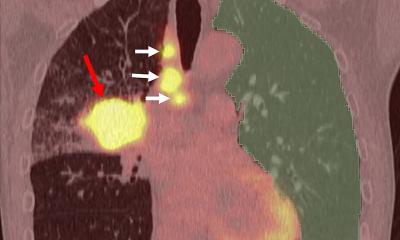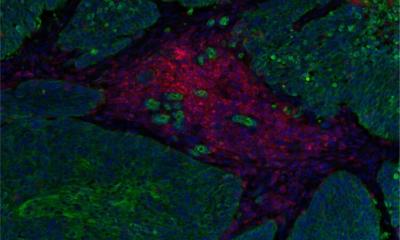News • HER2-targeted therapy
Promising results for therapy of non-small cell lung cancer
New data from researchers at Memorial Sloan Kettering Cancer Center (MSK) featured at the European Society for Medical Oncology (ESMO) Congress 2021 highlights a promising new treatment for individuals with HER2-mutant non-small cell lung cancer (NSCLC).

The phase II multicenter, international DESTINY-Lung01 trial found that trastuzumab deruxtecan, a HER2 antibody-drug conjugate, in patients with HER2-mutant NSCLC demonstrated robust and durable anticancer activity. Trial findings were presented during the virtual ESMO Congress 2021 meeting in September 2021 by MSK’s Bob Li, MD, PhD, MPH, first author and principal investigator; Physician Ambassador to China and Asia-Pacific; and Chief Scientific Officer, MSK Direct.
“These results are extremely promising for this group of patients who have typically been difficult to treat with other forms of treatment,” explained Dr. Li. “Researchers and physicians at MSK have been studying HER2 in lung cancer for two decades and this marks another paradigm shifting therapeutic breakthrough for patients.”
Recent efforts in targeting HER2-mutant NSCLC have produced encouraging but inconsistent results. HER2 mutations drive approximately three percent of nonsquamous NSCLC. Patients with these cancers are typically slightly younger in age, female, and never-smokers, and they often have a poor prognosis and an increased incidence of brain metastases. Although HER2 targeting has transformed the treatment of patients with breast and gastric cancers, currently no HER2-targeted therapies are approved for patients with NSCLC.
Between May 2018, and July 2020, 91 patients from North America, Europe and Asia with previously treated HER2-mutant NSCLC were enrolled and treated with trastuzumab deruxtecan for the phase II DESTINY-Lung01 trial. Among the 91 patients, 50 patients had a confirmed objective response (54.9%) and nearly all patients showed disease control (92.3%) with a reduction in tumor size. This is the first antibody-drug conjugate (a type of precision medicine) for lung cancer, the first therapy targeting HER2 mutations in lung cancer, and the first HER2-targeted therapy for lung cancer to have received a Breakthrough Therapy Designation by the U.S. Food and Drug Administration (FDA).
The research was published in the New England Journal of Medicine (NEJM).
Source: Memorial Sloan Kettering Cancer Center
22.09.2021





